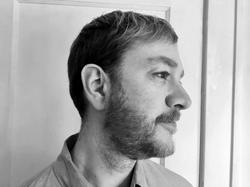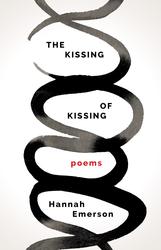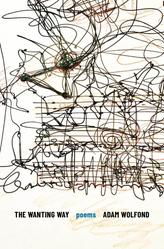
|
|
| Chris Martin (photo: Mary Austin Speaker) |
|
When someone asks me to define poetry, I often feel like their question goes against the very nature of poetry itself. In my experience, poetry is far less interested in what is than what might be. This desire, to understand the full breadth of what language can do, is one of the founding impulses behind Multiverse, the series of neurodivergent writing that I curate for Milkweed Editions. The poems you'll find in Multiverse books are not normal. They do not conform to standardization. They do not attempt to mimic the accepted modes of intelligence. Instead, the poems you'll find in Multiverse titles move in ways that are utterly unique to their authors, who are deeply invested in forging authentic connections with their readers.
 Take Hannah Emerson, for example. Her debut collection, The Kissing of Kissing, uses words that are common--please, beautiful, freedom, nothing--but by wielding those words in a way only she can, they become new again. This is not coincidental to her experience as a nonspeaking autistic individual. Because Emerson cannot move through the world along the path laid out by an ableist society, she has had to blaze a new path, and her language moves differently as well. Her unique style has drawn comparisons with other singular talents: Rumi, Emily Dickinson and Rainer Maria Rilke among them. And her book, just out in the world, has already received the attention and care of several reviewers--Barrelhouse, Luna Luna, the New York Times--each with their own connection to the work. In her poem "Giveness," she writes, "Please listen / to the poet because only way // to freedom from the fools. Just / keep the fools inside us loving / fool forgive him. It is ok to be / the fool you are helping / this great universe explode."
Take Hannah Emerson, for example. Her debut collection, The Kissing of Kissing, uses words that are common--please, beautiful, freedom, nothing--but by wielding those words in a way only she can, they become new again. This is not coincidental to her experience as a nonspeaking autistic individual. Because Emerson cannot move through the world along the path laid out by an ableist society, she has had to blaze a new path, and her language moves differently as well. Her unique style has drawn comparisons with other singular talents: Rumi, Emily Dickinson and Rainer Maria Rilke among them. And her book, just out in the world, has already received the attention and care of several reviewers--Barrelhouse, Luna Luna, the New York Times--each with their own connection to the work. In her poem "Giveness," she writes, "Please listen / to the poet because only way // to freedom from the fools. Just / keep the fools inside us loving / fool forgive him. It is ok to be / the fool you are helping / this great universe explode."
 As our universe explodes and expands, we find that it is actually an overlap of endless universes. One universe would symbolize a singular verse, but Emerson is not a singular exception. Her work takes place alongside countless neurodivergent writers, surfacing in concert with many other universes of language. The second book in the Multiverse series will be Adam Wolfond's The Wanting Way, which will arrive this November. Though Wolfond is also a nonspeaking autistic poet (and artist), his way of "languaging" is quite different from Emerson's. In "The Maker of Wanting Space," he writes, "I game the space the way / I open with the body and the way / I think which is the way / of water." So, even though the book proclaims a wanting way, this way is actually composed of multiple ways, body becoming architecture becoming sky becoming river. The book itself will feature a looping blue line that "yarns" its way through the pages, circling words as it goes, and a "ponding" or marginalia that spreads across the bottom of each page. Wolfond's desire for ways that reconnect us with the world and with ourselves reminds me of authors like Robert Macfarlane and Dara McAnulty.
As our universe explodes and expands, we find that it is actually an overlap of endless universes. One universe would symbolize a singular verse, but Emerson is not a singular exception. Her work takes place alongside countless neurodivergent writers, surfacing in concert with many other universes of language. The second book in the Multiverse series will be Adam Wolfond's The Wanting Way, which will arrive this November. Though Wolfond is also a nonspeaking autistic poet (and artist), his way of "languaging" is quite different from Emerson's. In "The Maker of Wanting Space," he writes, "I game the space the way / I open with the body and the way / I think which is the way / of water." So, even though the book proclaims a wanting way, this way is actually composed of multiple ways, body becoming architecture becoming sky becoming river. The book itself will feature a looping blue line that "yarns" its way through the pages, circling words as it goes, and a "ponding" or marginalia that spreads across the bottom of each page. Wolfond's desire for ways that reconnect us with the world and with ourselves reminds me of authors like Robert Macfarlane and Dara McAnulty.
The third author in the Multiverse series will be JJJJJerome Ellis, a musician and writer whose own experience of dysfluency, in the form of a glottal block stutter, makes him feel kindred with nonspeaking writers. For Ellis, dysfluency isn't an obstacle but an opening. His first book, The Clearing, functions as a prequel to the concerns in his forthcoming Multiverse book, *ster of ceremonies. Among them are questions like these: How can we let disability instruct us? How does care towards the body echo out into the more-than-human world? How do moments of pause allow us to hear what would otherwise be passed by? For Ellis, these questions require ceremony and community. They are questions to be shared and explored together. Ellis envisions writing among a chorus of the living and the dead, ancestors and contemporaries. And among a wild chorus of flora and fauna, relatives who possess their own recourse to voice and wisdom. In this approach, his work speaks alongside writers like Alexis Pauline Gumbs, adrienne maree brown and Robin Wall Kimmerer.
My greatest ambition is that Multiverse might constitute a community of care and for that community to be inclusive in the way it connects the often marginalized communities of neurodivergent, disabled, Mad, queer, neuroqueer, autistic, dysfluent, and BIPOC writers and readers. My experience in reading the books mentioned above is one of creative expansion, deep listening, and something that I can only call healing. And I think that's what I want most from books: to grow, learn, and uncover new territories (often beneath of our very feet) where flourishing is mutual. --Chris Martin
Chris Martin is editor-at-large of Multiverse, "a literary series dedicated to different ways of languaging," which recently launched as an imprint of Milkweed Editions. Martin is also the author of May Tomorrow Be Awake: On Poetry, Autism, and Our Neurodiverse Future (HarperCollins, August 9).

